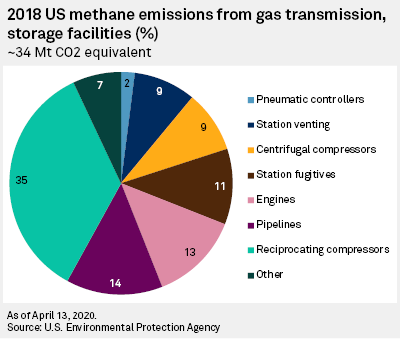Featured Topics
Featured Products
Events
S&P Global Offerings
Featured Topics
Featured Products
Events
S&P Global Offerings
Featured Topics
Featured Products
Events
S&P Global Offerings
Featured Topics
Featured Products
Events
Financial and Market intelligence
Fundamental & Alternative Datasets
Government & Defense
Professional Services
Banking & Capital Markets
Economy & Finance
Energy Transition & Sustainability
Technology & Innovation
Podcasts & Newsletters
Financial and Market intelligence
Fundamental & Alternative Datasets
Government & Defense
Professional Services
Banking & Capital Markets
Economy & Finance
Energy Transition & Sustainability
Technology & Innovation
Podcasts & Newsletters
26 Jan, 2021
By Corey Paul
A group of major natural gas pipeline operators pledged to work as an industry to cut carbon emissions with a goal of reaching net-zero greenhouse gas emissions from transmission and storage operations by 2050.
The Interstate Natural Gas Association of America's Jan. 26 announcement represented the strongest climate commitments to date by the group, whose members include the operators of almost 200,000 miles of pipeline. The pledge came at a time when developers face increasing difficulties in building major new interstate natural gas pipelines because of legal and political risks. Analysts also expect regulatory scrutiny of the pipeline industry to intensify under the administration of President Joe Biden.
INGAA's commitments focused on voluntary measures, building on a 2018 pledge to minimize methane emissions pipeline and storage infrastructure. In addition to members of the pipeline trade group pledging to cut their own greenhouse gas emissions and improve monitoring and reporting efforts, the industry group supported a series of other measures aimed at more broadly reducing the carbon footprint of the country's natural gas network. INGAA members adopting the set of climate change commitments include Kinder Morgan Inc., Williams Cos. Inc., Enbridge Inc. and Cheniere Energy Inc.
"Our goal and our commitment is we are going to work hard to start to decarbonize that energy delivery system, and there are going to be lots of different ways to do it," David Slater, INGAA's new chairman and the president and COO of DTE Midstream, said during a call with reporters. Slater pointed to a series of initiatives including adopting better methods of servicing equipment to minimize blowdown, using more efficient compression and valve infrastructure, and investing in lower-carbon fuels.
Other measures INGAA committed to included studying the feasibility of hydrogen blending in the existing natural gas system, supporting fast-ramping gas plants to support variable renewable-energy generation sources, and pursuing various technologies such as carbon-capture and renewable natural gas.
One notable absence from INGAA's climate commitments was support of direct methane regulations on the pipeline industry — a salient issue given efforts by the new presidential administration enact them. But INGAA signaled its support for negotiating.
"We would be open to federal new and existing-source methane regulations, but they need to be safe and sound and effective, and they need to really make sure that they avoid any unintended consequences that could impact reliability," INGAA President and CEO Amy Andryszak said. "And then also we want to make sure that companies have the appropriate flexibility to meaningfully minimize their own emissions from their operations."

Biden made establishing new methane regulations on the oil and gas sector one of his early priorities, directing the U.S. Environmental Protection Agency to publish a proposed rule undoing Trump-era rules by September that had rolled back most of the Obama-era methane regulations.
The Trump administration's rollbacks stopped regulating methane or volatile organic compound emissions from large pipelines and other transmission and storage infrastructure.
INGAA's opposition to the methane regulations under the Obama administration centered on leak detection and repair requirements for gas transmission and storage. The pipeline industry's top lobbying group said it was worried that a requirement to repair leaks within 30 days would threaten reliability in some cases, such as when a pipeline operator may have to order a new part that could take weeks to fabricate and deliver.
But INGAA Vice President Sandra Snyder said the organization would support the Obama-era regulations if that provision were addressed.
"We wanted to ensure that the regulation just be modified to recognize that there are certain situations where you may be waiting on a piece of equipment in order to make the necessary repair," Snyder said.
INGAA officials also said they were taking a wait and see approach to potential changes in the way the Federal Energy Regulatory Commission evaluates greenhouse gas emissions in the certification process for new interstate pipelines.
Despite the headwinds facing the industry, INGAA remains bullish on the demand for new pipelines. The group recently released a report that predicted North American pipeline companies will add nearly 33 Bcf/d of natural gas transportation capacity from 2020 through 2025.
"Over the last few years it has become more challenging to build pipelines, but we remain optimistic," Andryszak said, citing market demand for more gas transportation infrastructure and Biden's past comments in favor of natural gas. "President Biden was very supportive of natural gas on the campaign trail, and we're going to take him at his word. We still believe that we will be able to see pipelines continue to be built."